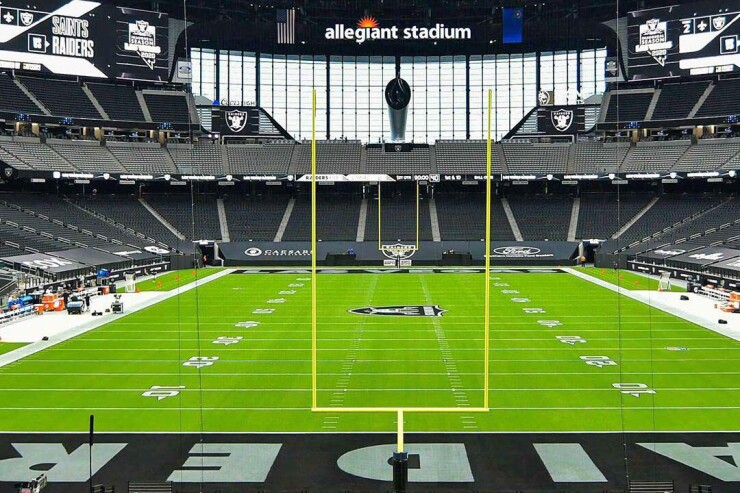Clark County, Nevada’s draw on reserves to make a December 1 payment on bonds used to finance Allegiant Stadium, the home of the NFL’s Las Vegas Raiders, doesn’t materially change the county’s credit quality, Moody’s Investors Service said.
The county withdrew $11.6 million from a reserve fund to make a $16 million debt payment on the $645.1 million in bonds issued in 2018 to help finance the cost of the stadium, according to a Nov. 25 filing on the Municipal Securities Rulemaking Board’s EMMA website.

The bonds have two reserve sub-accounts. The account that was drawn from will retain a balance of about $47.9 million, while the other untapped sub-account has $9.4 million.
The county tapped reserves “because of a decline in revenue from a hotel tax that was established to repay the debt, though the bonds are ultimately secured by the county's full faith and credit general obligation limited tax pledge,” Moody’s analyst William Oh wrote in a report Dec. 2. “The reserve account remains substantial and can support continued draws to make debt payments for several years if visitor volumes remain depressed because of the coronavirus pandemic.”
Moody’s Aa1 rating and stable outlook on the bonds is based on the county’s limited tax general obligation pledge and not the hotel room tax or the reserve fund, Oh wrote.
The reserve account was originally sized at average annual debt service, but grew due to excess coverage. Notably, Oh wrote, the draw is not an event of default under the indenture, nor is a failure to maintain the reserve.
The NFL approved the team's relocation to Las Vegas from Oakland, California, in 2017. The state
Moody’s Aa1 rating, and stable outlook, on the bonds is based on the county’s GOLT pledge and not the hotel room tax or the reserve fund, Oh wrote.
The Raiders are playing their first season in Las Vegas, but without any fans in the stand because of the pandemic.
"This action was expected in light of the decline in tourism to Las Vegas," Clark County spokesman Erik Pappa said in an email. "Fortunately, the financing for the Stadium Authority bonds included the funding of a debt service reserve fund to weather economic declines like the one Las Vegas is currently experiencing due to the pandemic.”
The stadium improvement bonds were issued in 2018 for the local contribution to build the stadium and are backed by Clark County’s GOLT pledge as well as a 0.88% room tax enacted in 2016 specifically to finance the stadium.
Through October, hotel room occupancy in Las Vegas is down more than 45% year-over-year, and revenue per available room is off more than 54%,
That helps explain why room tax collections were insufficient to cover debt service for the December 1 interest payment, Oh wrote.
Total debt service is $34.7 million in fiscal 2021, ending June 30, 2021, and $35.4 million in fiscal 2022.
“Given the size of the reserve account and modest additional hotel room tax collections, the county will not need to use property taxes or other legally available funds other than room tax revenue to cover debt service at least through fiscal 2022 and likely beyond,” Oh wrote.





